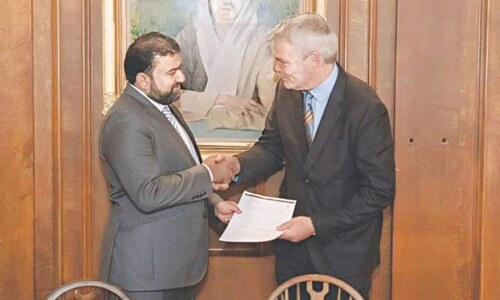Every year, Maher al-Rubaye would marvel at the gold-leaf walls of Iraq's Imam Ali mausoleum. He still visits the shrine today — through a screen from his living room.
The spread of the new coronavirus in Iraq has prompted the closure of major mosques to visitors, including the ornate burial place of Ali, the fourth Islamic caliph and relative of the Prophet Muhammad (PBUH), in the shrine city of Najaf.
Just a few hundred meters from the mausoleum, Rubaye — at home because of lockdown measures — extends one hand towards the sky in prayer and holds his mobile phone with the other.
On the screen flash images of the shrine: its large plaza, the marble floors and intricate calligraphy — and finally, the glittering mausoleum itself.

"I visit you, Commander of the Faithful," Rubaye recites, adding a Covid-19-mandated amendment: "... from a distance."
Iraq has reported over 3,000 coronavirus infections and more than 110 deaths since its first case was recorded nearly three months ago in Najaf.
Authorities have since imposed a nationwide lockdown that has shut airports, restaurants and schools and prohibited travel between provinces.
'Valid' visit
The pandemic has battered Iraq's religious tourism sector, which constitutes around half of its non-oil economy.
A normal year would see millions of Shia pilgrims visit shrines in Najaf and nearby Karbala, travelling from neighbouring Iran, Pakistan or even India.
The billions of dollars generated from pilgrims annually creates jobs for hundreds of thousands of Iraqis — constituting almost the only form of tourism in a country ravaged by decades of conflict.
But the narrow alleyways radiating out from the shrines, typically bustling with locals and tourists en route to prayer, are now eerily empty. Wooden stalls where religious trinkets and other souvenirs are usually laid out have been shrouded in plastic for weeks.

The sounds of an occasional tweeting bird and the call to prayer five times daily —- followed by an addendum to do so at home to avoid crowds — have replaced the din of bartering, clinking coffee cups and shuffling feet.
"In these current circumstances, with the confinement imposed by governments across the world, virtual pilgrimages are as valid as the normal ones," said Ali al-Atabi, a sheikh in Najaf's Old City.
Religious tourism had already seen a dip since October, when anti-government protests erupted in Baghdad and across the country's Shia-majority south.
Old rites, new tech
The closures are particularly jarring as most shrines remained open during the bloodiest years of Iraq's sectarian violence, which saw suicide bombers target religious sites and densely populated neighbourhoods.

But over time, some shrines have developed new ways for the faithful to experience a centuries-old tradition.
TV channels air round-the-clock images from the mausoleums, and in Najaf, a hotline provides a free audio guide to visit the site.
"Salam aleikum" — peace be upon you — a male voice says in a recorded message, reciting the typical Muslim greeting in Arabic. "Welcome to a pilgrimage of Imam Ali," it continues, pausing for the caller to recite the prayer intoned upon entering the shrine in real life.
Still, for Iraqis marking the holy month of Ramazan this year without their pilgrimage traditions, it's an unaccustomed change.
"I'm dreaming of visiting the Imam Ali shrine, which we Shias normally pray at every single night in Ramazan," lamented Numan al-Saadi, another resident of Najaf.
"Today, I can only see it from a distance through my phone," he said.










































